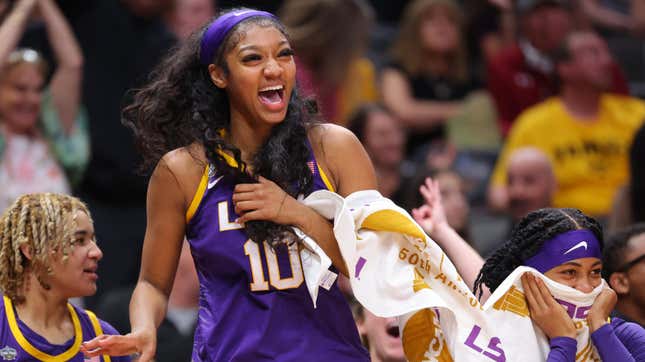Angel Reese Is an NCAA Champion, Racist Trolls Be Damned
After LSU won the women's NCAA championship, white men on the internet dog-piled Reese for using the same taunting gesture that Caitlin Clark was applauded for.
EntertainmentEntertainment

Sunday night marked a banner moment for NCAA women’s basketball, and particularly for LSU, who took home the program’s first-ever March Madness trophy after beating the Iowa Hawkeyes 102-85. At the center of the historic win was Angel Reese, LSU’s star sophomore forward who was awarded Most Outstanding Player during the women’s Final Four showdown. She led LSU to score the most points in NCAA championship history and set the NCAA record for the most double-doubles (34) in a single season, according to Just Women’s Sports. She is, first and foremost, an NCAA champion, and she deserves her title ring—and her crown—without complications.
But that’s not how an embarrassing portion of the internet—rather, racist white men on Twitter—saw things. In the final seconds of Sunday night’s championship game, with the championship all but secured for LSU, Reese threw John Cena’s infamous “you can’t see me” gesture at Iowa’s Caitlin Clark—one of the tournament’s standout “generational” players widely considered to be shaping the game in real-time. Then, after the buzzer sounded, Reese tapped her ring finger while still staring down Clark.
Trolls like Barstool’s Dave Portnoy called Reese, 20, a “classless piece of shit” for doing so, while Keith Olbermann (some podcaster) called her a “fucking idiot.” Olbermann later apologized, while still arguing that Reese’s MVP performance would be overshadowed by her “classless” behavior. Basketball giants like LeBron James and Shaquille O’Neal even got involved, defending Reese’s right to be her authentic self (a “Black queen,” as she says) on the court. In the words of Shaq, Olbermann can go “shut [his] dumb ass up.”
But as people (read: “misogynists”) continued to harp on the nature of Reese’s celebration, the word “taunting” started trending on Twitter.
-

-

-

-

-

-

-

-

-

-

-

-

-

-

-

-

-

-

-

-

-

-

-

-

-

-

-

-

-

-

-

-

-

-

-

-

-

-

-

-








































